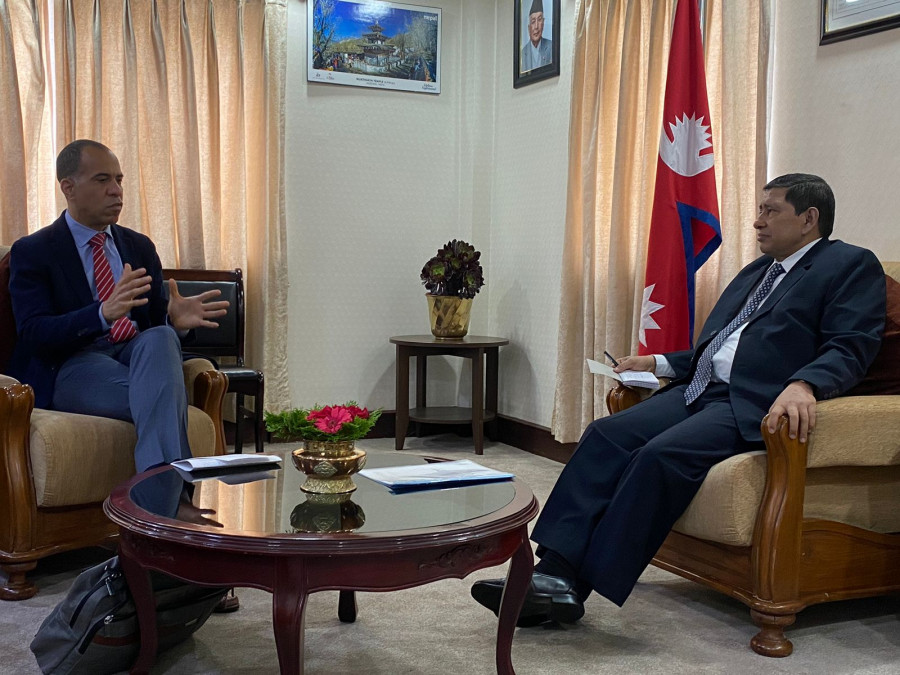
With the Millenium Challenge Accounts-Nepal (MCA-Nepal) already inviting bids for the construction of transmission line projects under the Millenium Challenge Corporation Compact, a US grant agreement, there is question of whether the Chinese companies can take part.
Prior to the Parliament’s ratification of the MCC Compact last year, there were rumours of an alleged Chinese hand in spreading ‘disinformation’ about the grant. Violent protests preceded the parliamentary nod to the compact on February 27 last year.
The $500 million US programme will officially aim to help Nepal develop high-capacity transmission lines and improve roads identified as critical for economic growth.
After the House of Representatives passed it, there has been no notable opposition to the package and MCA-Nepal, a special purpose vehicle established to implement the MCC project, issued a global tender notice on November 28 last year, preparing three packages of the 315-km transmission line. The bid submission deadline has been extended till May 22.
In a written response to the Post’s questions, the MCA-Nepal said that Chinese companies have not been barred from the tender process.
“Private companies from all over the world can bid,” said the MCA- Nepal. “But countries such as Cuba, North Korea, Iran and Syria are debarred or suspended from participation in procurements funded by the United States federal government.”
These four are facing US sanctions as authorised by Section1754(c) of the National Defense Authorization Act for Fiscal Year 2019, section 40 of the Arms Export Control Act, and section 620A of the Foreign Assistance Act of 1961. The countries were deemed by the US Secretary of State to have provided support for acts of international terrorism based on these laws.
Bidding under the Compact is an open competitive process with maximum transparency and fairness, the MCA-Nepal said. “There will not be any restriction on any companies because they are Chinese.”
Given the possibility of government-owned companies receiving subsidies, the MCA-Nepal said state-owned firms would not be eligible to submit their bids.
With the entry into force of the MCC Compact scheduled for August, the MCA-Nepal aims to soon conclude the bidding process.
Before the Parliament’s endorsement of the MCC Compact, US officials had hinted at Chinese hand in instigating the protests, though they didn’t directly point fingers at China.
In the middle of February last year, an unnamed US spokesperson told The Hindustan Times that the US believed in Chinese hands in fomenting protests against the American aid programme.
Asked if the US believed ‘propaganda’ against the MCC had been “actively fomented or funded or encouraged or facilitated, or all the above, by China,” the spokesperson said “Yes”, according to the report. “We have been concerned about disinformation campaigns surrounding the MCC Compact, as we are concerned with disinformation everywhere. Should outside influence or corruption have influenced parliamentarians’ actions to vote against this electricity-transmission project, it would be a deeply disappointing and a loss for the people of Nepal.”
As the protests against the MCC Compact were at boiling point, China had accused the US of practising ‘coercive diplomacy’ in Nepal on the MCC grant programme.
Referring to a news report that the US urged Nepal to endorse the MCC by February 28 2022, Global Times, a Chinese nationalist tabloid, quoted Wang Wenbin, a spokesperson for the Chinese foreign ministry, as saying that “China opposes ‘coercive diplomacy’”.
Subsequently, on February 24, during a regular press briefing in Beijing, another Chinese Foreign Ministry spokesperson, Hua Chunying, who is also the assistant minister of foreign affairs, questioned: “If the US is giving a gift to Nepal, then why is it setting a deadline?”
The remarks from Beijing came after the US Embassy in Kathmandu said that the “$500 million MCC grant is a gift from the American people and a partnership between our nations that will bring jobs and infrastructure to Nepal and improve the lives of Nepalis”.
The Post had reported earlier that US Assistant Secretary of State Donald Lu had warned the top leaders in Kathmandu that Washington would review its relations with Nepal in the event of its Parliament’s failure to ratify the MCC compact by February 28, 2022.
Since its endorsement, the political environment for the implementation of the MCC Compact has been favourable, according to the MCA-Nepal.
“Given that Nepal’s Parliament already endorsed the MCC Compact, Nepal will implement it successfully as a country that follows rules of law,” said Deputy Prime Minister and Home Minister Narayankaji Shrestha, during his meeting on Saturday with Jonathan Brooks, deputy vice president of MCC for Europe, Asia, Pacific, and Latin America.
In a statement issued by Shrestha’s secretariat, the DPM had reminded the MCC official that Nepal had endorsed the MCC compact with an interpretative declaration as per the wish of Nepali people. He had officially sought Washington’s opinion on the declaration.
In response, Brooks “welcomed the interpretative declaration”, according to the statement from Shrestha’s secretariat.
But some say there is no need for formal approval from the US with the donor country not objecting to the interpretative declaration and the MCC board acknowledging the Nepal parliament’s decision to ratify it.
During the meeting on Saturday, Brooks had also brought up issues like agreement between Nepal and India on the (cross-border) transmission line, land acquisition and forest clearance as the project must be completed within five years after the MCC Compact’s entry into force.
The MCA-Nepal is concerned about the possible obstruction during land acquisition; it has initiated the process of clearing land on which transmission pylons will stand.
“It will not be a matter of surprise if MCA-Nepal would have to face challenges in the process of land acquisition based on the experiences of other similar projects,” the MCA-Nepal said. “But we are hopeful that the process will be smooth as in Ratmate because of the unique Rehabilitation Action Plan and Livelihood Restoration Programme we are going to implement for the project-affected people.”












